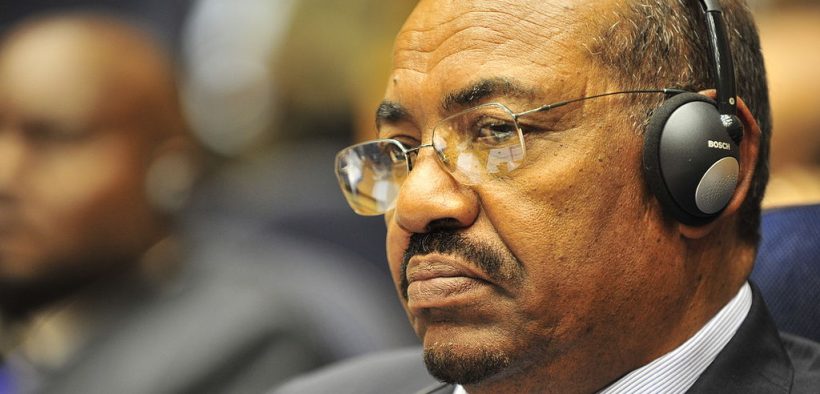Omar Al-Bashir’s Political Party Banned in Sudan

A decree was passed yesterday prohibiting the participation of al-Bashir’s National Congress Party (NCP) in political activities for 10 years. The properties and assets of the party are to be confiscated and its members removed from all public institutions.
“Sudan without Islamists. Sudan for all People” was the chant on the streets of the capital Khartoum late last night. Hundreds of demonstrators were on the streets celebrating after a law which dismantles the regime of the ousted president Omar al-Bashir was passed by the transitional government late last night.
Another law was passed to scrap the Public Order Act, which imposed a code of conduct based on Sharia Law on women. The act, passed under the Bashir’s rule, had mandated a dress code for women, regulated their social interaction, and restricted their freedom of movement.
These laws were passed after the first joint legislative session of the cabinet and the sovereignty council of the recently formed transitional government, which went on for 14 hours.
The National Congress Party (NCP), which is now effectively banned, is helmed by Omar al-Bashir, who had seized power through a coup in 1989 and ruled over Sudan until he was ousted in April this year after months of mass demonstrations that began in December 2018.
This party is now legally prohibited from participating in political activities for a period of 10 years. The legislative decree also directs the confiscation of all properties and assets of the party, and the removal of NCP members from all public institutions, government agencies and state owned enterprises.
Sudan Tribune reported that according to Justice Minister Nasr al-Din Abdel Bari, an 18-member committee will be established to provide recommendations to competent authorities on the specific measures that need to be taken in order “to dissolve any government agency, political party, organization, union, commission, company or other partisan bodies belonging to.. [Bashir’s] regime and end the service of its employees.”
This represents a major victory for the masses of demonstrators, who, in their effort to put an end to Bashir’s rule, had for months endured mass-arrests, torture and shootings which fatally injured hundreds.
Under the NCP’s rule, all independent unions in the country were banned. Sharia law was introduced and often used selectively to target political opponents. Imprisonment without trial and torture of dissidents was ubiquitous.
The International Criminal Court (ICC) has found al-Bashir guilty of genocide, war crimes and crimes against humanity for overseeing a campaign of mass-murder and rapes in the war-torn Darfur region.
The Sudanese Revolutionary Front (SRF), which is a coalition of armed groups with whom peace negotiations are currently underway, have been insisting that al-Bashir be handed over to the ICC.
This demand has been reiterated by the Sudanese Professionals Association (SPA), which along with the Sudanese Communist Party (SCP), led the mass-demonstrations that finally toppled al-Bashir, and subsequently forced the military junta, which had then assumed power, to make way for a transitional government.
However, the transitional government was created on the basis of a power sharing agreement between the military junta and the Declaration of Freedom and Change Forces (DFCF). The DFCF is a coalition of left and centrist parties which came together to represent the protest movement.
As a result of this agreement, members of the junta, including its President, General Abdel Fattah Al-Burhan, became members of the sovereignty council, alongside the civilians chosen by the DFCF.
Burhan who will serve as president of the country for the first 21 months of the 39-month-long transition period, has opposed handing al-Bashir over to ICC. The SPA rejected his position and wrote in a statement on Saturday, “We must take into account the desire of the victims to see al-Bashir handed over to the international justice, to affront him and to those who were under his command and to heal the bereaved.”
The SPA welcomed the decree that calls for the dismantling of the NCP, though it continues in its primary task of building the movement and mobilizing the masses in order to achieve justice and true transformation. The association had made it clear from the beginning of the mobilizations that it would not stop at the removal of al-Bashir from presidency but will fight on until the regime in its entirety is dismantled.
Despite the “late issuance” of this decree, the SPA said, it “is a great step in the way of achieving the goals of the revolution, and the real defeat of the counter-revolution and remnants of the regime of oppression…It is an important step towards building a democratic civil state.”
Abdalla Hamdok, the Prime Minister of the transitional government who was chosen by the DFCF, tweeted, “We passed this law in a joint meeting to establish justice and respect the dignity of the people, and safeguard their gains, and so that the people’s looted wealth can be recovered.”
Commenting on the scrapping of the Public Order Act, he said the act was “a tool of exploitation, humiliation, violation – violation of the rights of citizens, and a violation of the dignity of the people”
Under this act, women were arrested for attending parties or wearing trousers or simply stepping out of the house with a male companion other than her husband or a family member. According to human rights activists, every year thousands of women were subjected to public flogging for violating the oppressive codes prescribed in this act.
“I send a tribute to the young men and women of my country who have endured the horrors of the application of these laws,” the Prime Minister said.













